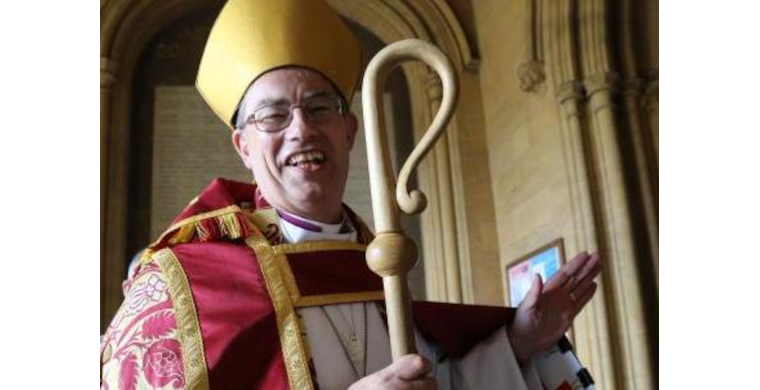Oh, That Crafty Bishop Croft of Oxford
By Rollin Grams
https://bibleandmission.blogspot.com/
November 03, 2022
The Anglican bishop of Oxford, Steven Croft, has this week produced an argument to extend marriage to same-sex couples.[1] Whatever his reasons for this, his justification involves an appeal to Matthew 7. Revisionists of orthodox Christianity 'use' Scripture, they do not interpret it, and so their Scriptural justifications are not their actual reasons for the views they advocate. Be that as it may, consider his use of the following passage:
Matt. 7:15 "Beware of false prophets, who come to you in sheep's clothing but inwardly are ravenous wolves. 16 You will recognize them by their fruits. Are grapes gathered from thornbushes, or figs from thistles? 17 So, every healthy tree bears good fruit, but the diseased tree bears bad fruit. 18 A healthy tree cannot bear bad fruit, nor can a diseased tree bear good fruit. 19 Every tree that does not bear good fruit is cut down and thrown into the fire. 20 Thus you will recognize them by their fruits.
Croft focusses on the notion of fruit in the passage. He says that 'the view that it is wrong to bless same-sex unions, to allow clergy to marry their civil partners, and to prohibit clergy and ordinands from an active sexual relationship' produces bad fruit. The bad fruit he has in view are: shame and unworthiness for LGBTQ+ people in the Church; attempts to change oneself or others; 'failed or damaged marriages for those trying to be something that they are not'; dishonesty for those who deny the reality of sexual identity. More bad fruit is the Church's being viewed as lacking love and fairness in the eyes of society. Croft then lists what he believes to be the good fruit of those in same-sex relationships. He continues on for a while about good and bad fruit.
So, what are we to make of this? First, one must state the obvious: on Croft's view, for 2,000 years, the Church has been bearing very bad fruit on its views on sexuality and marriage. He would have to argue that the Church was wrong to argue its views from the start, when these views ran counter to Graeco-Roman culture. As British culture shifts to a post-Christian view, in Croft's view the Church needs to shift as well otherwise it would occupy a 'different moral universe.' This was, however, precisely where the Church was again and again as it encountered societies diametrically opposed to its ethics and won them over to Christian culture.
Yet the use of Matthew 7 is the focus of this response. Too often, people use some words of Scripture to make a point but never give thought to what the Biblical text actually means. From the passage quoted above, one might note, first, that Croft skips over any reference to v. 15: 'Beware of false prophets.' He also does not consider the paragraph in the chapter, which begins with the words, 'Not everyone who says to me, 'Lord, Lord,' will enter the kingdom of heaven, but the one who does the will of my Father who is in heaven' (v. 21). The people that Jesus is warning His disciples about are false prophets who call Him 'Lord,' who can list powerful 'fruit' of their ministry in prophesy, casting out demons, and doing mighty works in Jesus' name (v. 22). One might have thought that such results in ministry would indicate fruit of deep spirituality and good character. What, then, makes one a bad minister confessing Jesus as Lord? What is it that is bad fruit? The answer in v. 21 is the answer in so much of the Sermon on the Mount: a rejection of God's commandments. Jesus says that He will say to them, 'Depart from me, you workers of lawlessness' (7.23). Lawlessness means not abiding by God's Law. Earlier, Jesus said:
Therefore whoever relaxes one of the least of these commandments and teaches others to do the same will be called least in the kingdom of heaven, but whoever does them and teaches them will be called great in the kingdom of heaven. 20 For I tell you, unless your righteousness exceeds that of the scribes and Pharisees, you will never enter the kingdom of heaven (5.19-20).
The fruit, then, that Jesus has in mind is whether people do God's will, that is, obey His commandments. Despite Croft's clever list of bad fruits of those who do abide by God's commandments, the fact is that he is, by any obvious reading of the text, exactly the sort of false prophet that calls Jesus 'Lord'--as we might imagine he does as a bishop--but whom Christ excludes from the Kingdom. God's law says,
If a man lies with a male as with a woman, both of them have committed an abomination; they shall surely be put to death; their blood is upon them (Leviticus 20.13).
This is why the Church has said what it has said for 2,000 years--and God's people before Christ for hundreds of years before that. Bishop Croft is the one to be judged by the fruit he bears, to see if he is a false prophet. Jesus means by fruit whether prophets tell people to live by God's commandments or not. Seldom can one find an author demonstrate what a passage actually means so clearly as he attempts to make the text mean something that it does not.
[1] Steven Croft, 'Extend goods of marriage to all,' Church Times (3 Nov., 2022); available online: https://www.churchtimes.co.uk/articles/2022/4-november/comment/opinion/extend-goods-of-marriage-to-all (accessed 3 November, 2022).














